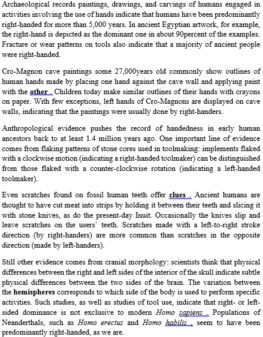Read the following passage and mark the letter A, B, c, or D on your answer sheet to indicate the correct answer to each of the questions from 43 to 50
Pollution emitted in industrial areas represents a threat to human health and the surrounding natural resources. We have a tendency to believe that the production processes are the only source of environmental damage, and often forget about the possible long-term effects of harmful production practices. We may think that the closure of these huge industrial areas would improve the quality of the environment. Unfortunately, this ignores the threat of the remaining waste, which is abandoned and poorly stored. It represents an even bigger danger because it stands neglected as it degrades and leaks into the earth without any control at all.
Changes in the water chemistry due to surface water contamination can affect all levels of an ecosystem. It can affect the health of lower food chain organisms and, consequently, the availability of food up through the food chain. It can damage the health of wetlands and damage their ability to support healthy ecosystems, control flooding, and filter pollutants from storm water runoff. The health of animals and humans are affected when they drink or bathe in contaminated water. In addition water-based organisms, like fish and shellfish, can pile up and concentrate contaminants in their bodies. When other animals or humans eat these organisms, they receive a much higher dose of contaminant than they would have if they had been directly exposed to the original contamination.
Contaminated groundwater can badly affect animals, plants and humans if it is removed from the ground by manmade or natural processes. Depending on the study of rocks of the area, groundwater may rise to the surface through springs or seeps, flow sideways into nearby rivers, streams, or ponds, or sink deeper into the earth. In many parts of fhe world, groundwater is pumped out of the ground to be used for drinking, bathing, other household uses, agriculture, and industry.
Contaminants in the soil can harm plants when they take up the contamination through their roots. Eating, breathing in, or touching contaminated soil, as well as eating plants or animals that have piled up soil contaminants can badly affect the health of humans and animals.
Air pollution can cause breathing-related problems and other bad health effects as contaminants are absorbed from the lungs into other parts of the body. Certain air contaminants can also harm animals and humans when they contact the skin. Plants rely on breathing for their growth and can also be affected by exposure to contaminants moved in the air.
Question:Which of the followings is NOT badly affected by contaminated groundwater?
A. Humam
B. Plants
C. Rocks
D. Animals




Đáp án C
Cái gì không bị ảnh hưởng xấu bởi nước ngầm bị ô nhiễm?
A. con người B. cây cối C. hòn đá D. động vật
=> đáp án C